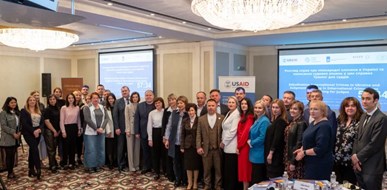Training for Ukrainian Judges
Published 30 April 2024
Photo by Global Rights Compliance.
In April 2024, Global Rights Compliance (GRC) brought together international experts and Ukrainian judges for a training on the adjudication of international crimes trials in Ukraine, as part of the GRC and the T.M.C Asser Institute’s MATRA-Ukraine project.
The training aimed to:
- Advance the practical knowledge of judges on aspects of evaluating evidence in atrocity crimes trials.
- Deepen understanding of the legal framework of international crimes and how it applies in real cases and scenarios.
- Develop insight into the modes of liability applicable to international crimes under the Ukrainian Criminal Code.
- Emphasize the importance of victim-centred, gender-sensitive, and child-sensitive approaches in adjudicating international crimes.
The programme included sessions on:
- The commonly found crime base evidence in atrocity crimes trials, the importance and challenges of linkage evidence, and various judicial approaches to evidence evaluation in atrocity crimes trials.
- The scope of international crimes under the Ukrainian Criminal Code, including war crimes, genocide, and aggression.
- How modes of liability under the Ukrainian Criminal Code and international law can be applied to atrocity crimes in Ukraine.
- The adjudication of conflict-related sexual violence (CRSV) and crimes against and affecting children (CAAC), following gender- and child-sensitive, victim-centred, and trauma-informed approaches.
The training programme was designed to enhance the practical knowledge and capabilities of the participating judges, emphasizing examples and practical exercises derived from the Ukrainian context.
This training built upon the ‘Benchbook on the Adjudication of International Crimes under Ukrainian Domestic Law’, which GRC contributed to under the MATRA programme, in partnership with the National School of Judges (NSJ) and the USAID Justice for All Activity. The training was organized with the USAID Justice for All Activity and supported by the NSJ.
